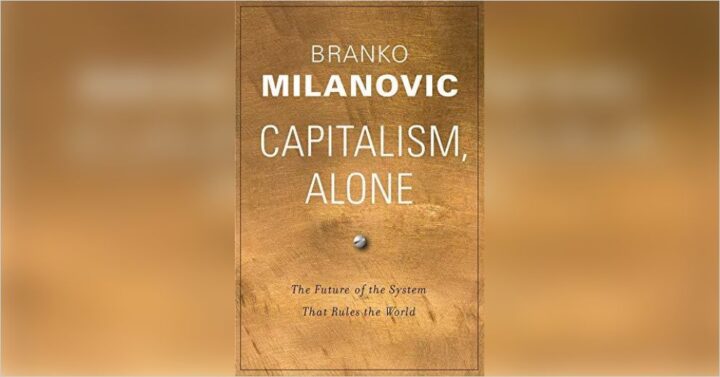Capitalism, Alone is a thought-provoking exploration of global capitalism, authored by economist Branko Milanovic. Set in the modern world, the book delves into the dominance of capitalism as the prevailing economic system and examines the two key models shaping the global landscape: “liberal meritocratic capitalism,” largely represented by Western countries, and “political capitalism,” notably seen in China. Milanovic argues that capitalism has emerged as the only viable economic system, but his analysis reveals deep flaws and disparities within it. The book addresses global inequality, the tension between capitalism and democracy, and the rise of a new elite who shape societal power structures.
Milanovic explores how historical events, particularly the fall of communism, contributed to capitalism’s global dominance. The author provides in-depth historical context to illustrate why alternative systems failed and why capitalism, despite its flaws, persists. He further dissects how political capitalism, primarily associated with authoritarian regimes, contrasts with the Western model, offering a nuanced analysis of its strengths and weaknesses. Through this comparative analysis, Milanovic seeks to demonstrate that both forms of capitalism contribute to inequality, albeit in different ways.
- ADVERTISING - continue reading below -
The author also discusses how capitalism has fostered a unique cultural phenomenon: the “homoploutia” class, a wealthy elite with influence over both political and economic spheres. This phenomenon has reinforced global income disparities, creating an environment where social mobility is limited, and wealth is concentrated among the few. Milanovic’s argument here is critical, pointing out the consequences of unchecked capitalism on social and political equality.
A crucial theme Milanovic examines is the interaction between capitalism and democracy. He argues that while democracy theoretically promotes equality, capitalism often undermines it, creating a tension that destabilizes societies. The rise of political capitalism, with its authoritarian features, presents a challenge to democratic ideals, raising concerns about the future of global governance. The book suggests that this tension may lead to social unrest and instability as inequality continues to grow.
In the final sections, Milanovic contemplates the future of capitalism and potential reforms that could mitigate its negative effects. He suggests progressive taxation, improved welfare systems, and adjustments in the political sphere to curb the power of the elite. These proposals reflect his belief that capitalism is not intrinsically flawed, but its unregulated form has detrimental consequences for society.
Ultimately, Capitalism, Alone provides a compelling critique of capitalism’s global dominance and poses challenging questions about the sustainability of such an unequal system. Milanovic’s work is well-suited for readers interested in economics, politics, and social justice, offering a nuanced view of capitalism’s impact on contemporary society.
Plot Analysis:
While not a traditional narrative, Capitalism, Alone presents a coherent and well-organized argument, structured around key economic models and supported by historical and comparative analysis. Milanovic’s structure is logical, taking readers through the origins, variations, and impacts of capitalism. The pacing is consistent, balancing detailed economic analysis with broader social commentary. Originality lies in Milanovic’s nuanced examination of both liberal meritocratic and political capitalism, providing readers with fresh insights into these distinct yet interconnected systems.
Score: 9/10
Character Analysis:
Though there are no characters in a traditional sense, Milanovic does introduce abstract “characters” like the “homoploutia” class and the “middle class.” These concepts are well-developed, acting as representations of socioeconomic groups affected by capitalism. Milanovic’s treatment of these societal “characters” helps readers visualize the effects of capitalism on different demographics.
Score: 8/10
Illustrations:
The book does not include illustrations. However, Milanovic’s use of data visualizations and graphs to support his arguments compensates effectively, offering readers visual insights into complex economic data.
Score: N/A
Writing Style:
Milanovic’s writing is clear and articulate, blending economic terminology with accessible language. His tone is analytical yet empathetic, aiming to make complex economic theories approachable. The book’s structure is well-organized, allowing readers to follow his arguments without difficulty. Milanovic’s skill in translating data into engaging prose is commendable.
Score: 8/10
Themes:
Key themes include the dominance of capitalism, global inequality, democracy vs. authoritarianism, and the role of the elite. Milanovic thoroughly explores these themes, providing an extensive critique of capitalism’s impact on social and political structures. The themes are relevant and timely, addressing pressing issues such as income inequality and the sustainability of democratic values.
Score: 9/10
Educational Value:
Capitalism, Alone is highly educational, offering readers a well-rounded understanding of modern economic systems and the political ideologies intertwined with them. Milanovic’s explanations of economic concepts, paired with historical context, make it an excellent resource for those seeking to understand global economics.
Score: 10/10
Emotional Impact:
While primarily analytical, the book carries an emotional weight, especially in its discussions on inequality and the erosion of democracy. Milanovic’s critique of capitalism’s impact on social mobility and political power resonates with readers, stirring concern for future generations.
Score: 7/10
- ADVERTISING - continue reading below -
Cultural Significance:
As a critical analysis of capitalism, Capitalism, Alone is culturally significant, especially in today’s polarized economic and political climate. Milanovic’s work resonates with debates surrounding economic reform, making it a valuable contribution to discussions on wealth distribution, democracy, and social justice.
Score: 9/10
Final Rating:
Capitalism, Alone is a comprehensive and thought-provoking analysis of capitalism’s global dominance and the socio-political consequences of inequality. Milanovic’s balanced critique and accessible writing make it a standout contribution to economic literature.
Overall Score: 9/10
Views: 2



